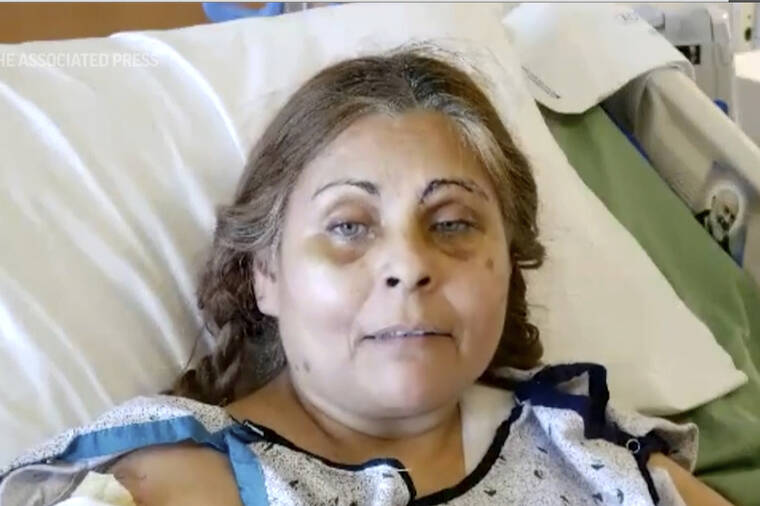A woman pulled alive from the rubble of a Pennsylvania chocolate factory after an explosion that killed seven co-workers says flames had engulfed the building, and her arm, when the floor gave way beneath her. That might have been the end, if she hadn’t fallen into a vat of liquid chocolate.
The dark liquid extinguished her blazing arm, but Patricia Borges wound up breaking her collarbone and both of her heels. She would spend the next nine hours screaming for help and waiting for rescue as firefighters battled the inferno and choppers thumped overhead at the R.M. Palmer Co. factory.
“When I began to burn, I thought it was the end for me,” Borges, 50, told The Associated Press in an exclusive interview from her hospital bed in West Reading, Pennsylvania, just minutes from the chocolate factory where she worked as a machine operator. Investigators from the National Transportation Safety Board planned to interview Borges on Friday.
The March 24 blast at R.M. Palmer killed seven of Borges’s co-workers and injured 10. Federal, state and local investigations are underway. A cause has not been determined, but the federal transportation safety agency has characterized it as a natural gas explosion.
Borges said she and others had complained about a gas odor about 30 minutes before the factory blew up. She is angry Palmer didn’t immediately evacuate. She said the deaths of her co-workers — including her close friend, Judith Lopez-Moran — could’ve been prevented.
Others workers have also said they smelled natural gas, according to their relatives. Palmer, a 75-year-old, family-run company with deep roots in the small town 60 miles (96 kilometers) northwest of Philadelphia, has not responded to questions about the workers’ claims.
Speaking in Spanish over videoconference, her eyes bruised and her burned right arm heavily bandaged, Borges recounted her terrifying brush with death.
The factory was getting ready for a product switch that day, so instead of running a candy-wrapping machine as usual, she was helping to clean.
At 4:30 p.m., Borges told the AP, she smelled natural gas. It was strong and nauseated her. Borges and her co-workers approached their supervisor, asking “what was going to be done, if we were going to be evacuated,” she recalled.
Borges said the supervisor noted someone higher up would have to make that decision. So she got back to work.
Just before 5 p.m., the two-story brick building exploded.
Borges, who’d been on a ladder, was thrown to the ground. She heard screaming. There was fire everywhere, and the flames quickly overtook her. “I asked God why he was giving me such a horrible death,” she said. “I asked him to save me, that I didn’t want to die in the fire.”
She began to run. That’s when the floor gave way, and she could feel herself falling — into a long, horizontal tank of chocolate in the factory’s basement. At 4 feet, 10 inches tall, Borges landed on her feet in chest-high liquid.
The chocolate extinguished the flames, but she believes her fall is what broke her feet.
The vat began filling with water from firefighters’ hoses, eventually forcing Borges to climb out as it reached neck level. She sat on the lip of the tank, then jumped into a pool of water that had formed on the basement floor. Briefly submerged, Borges said she swallowed a mouthful of water before surfacing. She grabbed onto some plastic tubing.
And then she waited.
“Help, help, please help!” she yelled, over and over, for hours. No one came.
The pain grew more intense. The water was frigid. The main supply pipe for the building’s fire suppression system had ruptured — and water was pouring into the basement. She lost track of time but thought she might be there for days.
“The only thing I wanted was to get out of there,” she said.
Finally, in the middle of the night, she saw a light and screamed anew for help.
Search-and-rescue dogs had alerted their handlers that a survivor might be in the rubble. Now, as rescuers carefully worked their way down to the basement, they heard Borges’s cries.
Calling for quiet, the rescuers followed the sound of her voice. They found her in a tight space, in chest-deep water. She made her way to them and was placed in a litter.
“She was severely hypothermic and banged up,” conscious but “absolutely confused,” said Ken Pagurek, who helped lead rescue efforts as program manager of Pennsylvania Task Force 1, an emergency response team that deploys to disaster sites around the country.
“I think had they not gotten to her when they did, there was a very good chance the number of victims was going to be plus one,” said Pagurek, also a captain in the Philadelphia Fire Department.
Her rescue gave hope to first responders who already had pulled two bodies from the rubble in the hours after the blast. Rescuers spent two more days at the pile. They found five more bodies but no additional survivors.
Borges now faces surgery on both feet and a long recovery. Her family has launched a GoFundMe campaign to help her pay the bills.
Borges, who came to the United States 31 years ago from Puebla state in south-central Mexico, has worked at Palmer for four years. She said she’s seeking accountability.
“I wanted to speak so that this will be prevented in the future,” she said. “For my colleague Judy, I want there to be justice.”
Rubinkam reported from northeastern Pennsylvania and Coronado reported from Austin, Texas.





